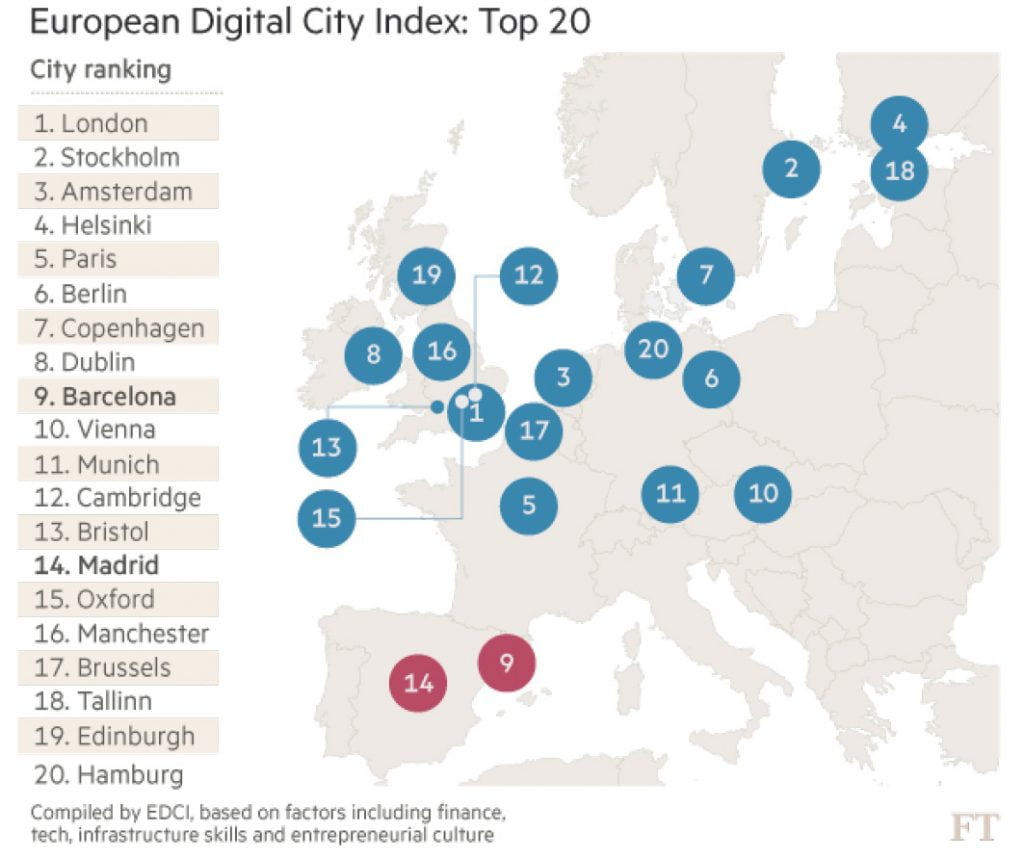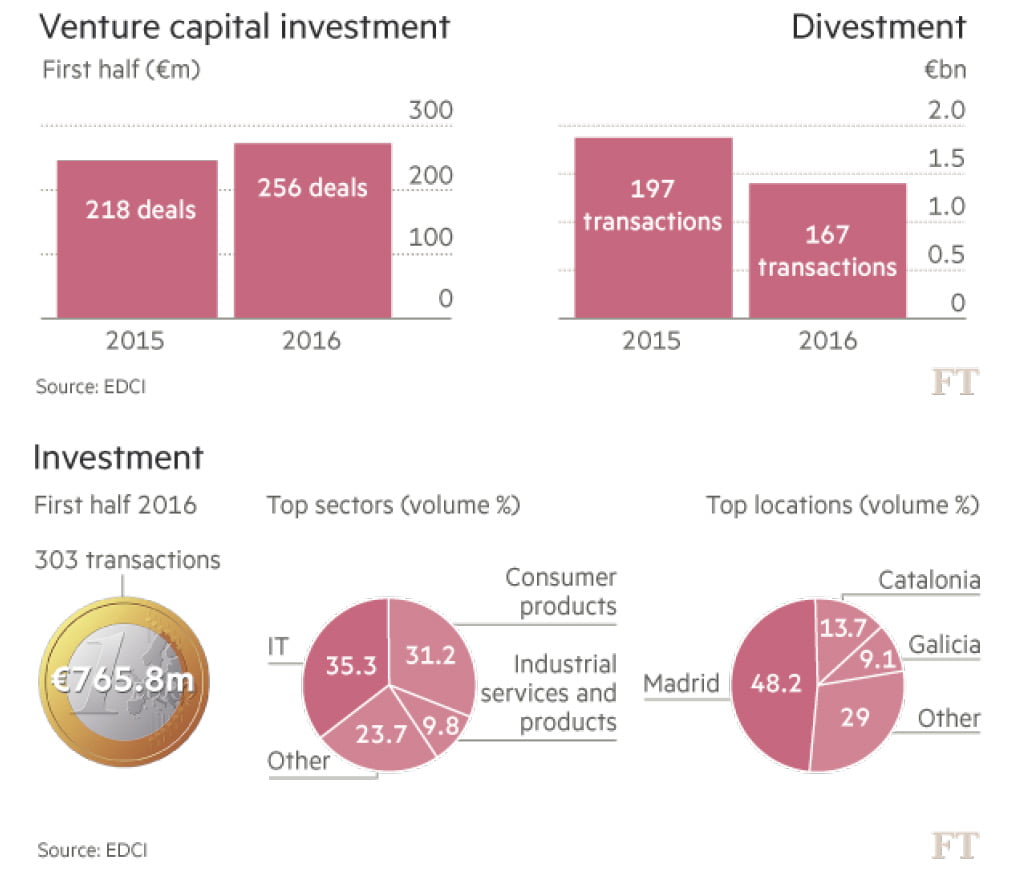Spain’s tech start-up scene begins to deliver
Improved funding and support systems help cutting-edge projects get off the ground.
Spain (https://www.ft.com/topics/places/Spain)’s technology entrepreneurs are striving to cross the divide that separates those who generate ideas from those who merely clone and adapt them for new markets.
A new generation of Spanish founders is working to turn fresh ideas into commercially-viable businesses, often in partnership with technology institutes, academia and potential customers. While many start-ups still target consumers or businesses, others are working at the frontier between the private and public sectors, often seeking to “do well by doing good”.
One example is Made of Genes. Based in Barcelona, it aims to develop a commercially-viable model that will make affordable genome sequencing widely available, while allowing the individual to control how the data are used.
Oscar Flores, co-founder and chief executive, says DNA sequencing technology is well proven and has great potential for improving human health. But it is expensive, at about €1,000 per person, unless the cost can be shared among potential beneficiaries. “The challenge is to find a business model that can work,” he says.
Across the city, DEA Drones reports interest from emergency services in several European countries. Its small team has developed an on-screen dashboard designed to help fire chiefs analyse real-time data from the scene, enabling them to respond more effectively.

The original idea was to deliver defibrillators using drones, says founder and chief executive Alfonso Zamarro. During discussions with emergency authorities, however, Mr Zamarro and his team identified a different problem that they believed they could solve. “They had cameras on firemen, cameras on drones, but they found it hard to pull all this information together to create an overall picture,” he says.
The emergence of more sociallyoriented companies is one indicator of the growing diversity and maturity of Spain’s start-up scene. Another is increased interest from international buyers in acquiring Spanish start-ups that have built enviable market positions, including some that extend deep into Latin America.
In August, eBay, the US online auction company, acquired Ticketbis, an online marketplace for tickets to events of all kinds, for a reported $165m. Founded in 2009 and based in Bilbao and Madrid, Ticketbis had developed its ticket market across 48 countries in southern Europe, Latin America and Asia. Ebay will combine Ticketbis with its US-based ticket exchange StubHub, extending the reach of a US market leader.
The success of Ticketbis is a reminder that Spain’s start-up scene enjoys exceptional geographical diversity. Unlike the UK, France and even Germany, where capital cities dominate activity and investment flows, Spain has two startup hubs that attract international attention — Madrid and Barcelona — and lively entrepreneurial scenes in some of its regions.
Data from ASCRI, the Spanish venture capital and private equity association, shows that the combined value of member investment portfolios in Madrid, at €7.2bn, is almost double the €3.8bn value of their investments in Barcelona. But members have also backed significant numbers of companies from the Basque country, Valencia, Galicia and Andalusia.

“Barcelona is very attractive and the ecosystem is working well there. But I would say that is true of Madrid also,” says Javier Ulecia, ASCRI chairman and founding partner of Bullnet Capital, a Spanish venture capital firm.
Since the economic crisis hit in 2008, Spanish entrepreneurs, investors and public administrators have been working hard to build a start-up culture
that will help to re-energise Spain’s economy, Mr Ulecia says.
The results of their efforts are beginning to show. “Last year was the best year ever in terms of volume invested in start-ups in Spain, and in the number of companies that received money from venture capital,” he adds.
Several factors have contributed to this performance. With unemployment stubbornly high at 18.9 per cent, (http://next.ft.com/content/ecff6e4c-9c1f-11e6-a6e4-8b8e77dd083a) leading companies in sectors including finance, telecoms and construction have been unable to absorb the flow of graduates from universities and technical institutes. This has prompted them to explore other options.
“It is difficult for engineers or those with scientific backgrounds to find interesting jobs in Spain, so they either migrate or they join young companies,” says Mr Ulecia.
While the airways to London and Berlin are well-travelled by talented young Spaniards, their home nation is becoming a competitive place to launch a tech start-up, says Mathieu Carenzo, general partner at Nero Ventures, a Barcelonabased venture capital fund.
“You will find very talented developers in Barcelona for €20,000 or €30,000 a year, which is half the price in Paris, one-third the price in London and a quarter the price in Silicon Valley,” says Mr Carenzo, who also lectures at Iese Business School.
“We used to get projects that were focused only on the Spanish market,” he adds. “Now the projects that you see are a lot more ambitious and … scaleable. That makes Spain more attractive for talents from across Europe.”
These ambitions are supported by an increasingly well-developed support system that today combines start-up incubators, specialist lawyers and experienced business advisers. Funding networks now include public money, venture capital and business angels.
Much progress has been made. Yet Mr Flores of Made of Genes stresses that financing systems are still adapting to the need for the long-term, high-risk funding that arises in the development and commercialisation of cutting-edge technologies, for example in medicine. This is the frontier where transformational technologies are often developed. Spain has pockets of scientific and technological leadership, but turning their ideas into worldbeating companies may still be an uphill struggle.
Source :
https://www.ft.com/content/60d113b6-9a09-11e6-8f9b-70e3cabccfae